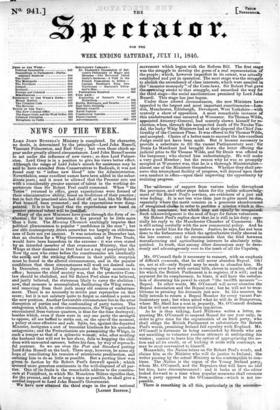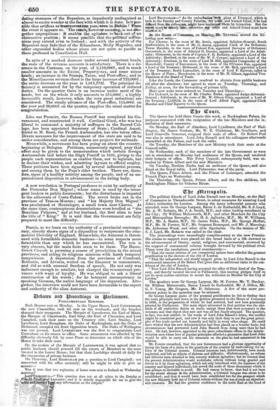Mr. O'Connell finds it necessary to reassert, with an emphasis
of difficult crescendo, that he will never abandon Repeal. Oh no, not at all—only Repeal may be made to abandon him. He is coming over here with certain bills, eleven in number, edicts of his which the British Parliament is to register, if it will ; and in payment for its complacency, he hints, it will have the satisfac- tion of disarming his power to extort "the twelfth measure "- Repeal. In other words, Mr. O'Connell will never abandon the Repeal Association and the Repeal rent ; but he will not be trou- blesome in pressing his demands juit now. In like manner, he fully intends to return a Repeal Member for every vacant Par- liamentary seat; but when asked what he will do at Dungarvan, where Mr. Sheil has a seat in jeopardy, Mr. O'Connell declares that he will not sanction needless opposition.
As he is thus talking, Lord Milltown writes a letter, re- questing Mr. O'Connell to suspend Repeal for one year only, in order to give time for the organization of an Irish party, who shall oblige the British Parliament to substantiate Sir Robert Peel's words,promising Ireland full equality with England. Mi. O'Connell is fortunate in being surrounded by friends who are not unwilling to volunteer random attempts at anticipating his wishes ; content to leave him the option'of appropriating the no- tion and all its credit, or of -kicking it aside with contempt, as
may be most convenient to himself. ..
Meanwhile, the Nation `seizes on Sir Robert Peel's words, and claims him as the Minister who will do justice to Ireland; the writer passing by the actual Ministry as too conteininikle to con- tinue. The Nation is the organ of the Young Ireland party, whom Mr. O'Connell, and the Repealers that will have no idol but him, have discountenanced : and it looks as if the editor looked forward to .a time when popular measures shall emanate from a party opposed to the O'Connellites—which is not im- possible. There is something in all this, particularly in the accomMo- dating sternness of the Repealers, so impudently undisguised as almost to excite wonder at the face with whihh it is done. Is it pos- sible that artifices so transparentean pass; even in Dublin ? lirom the event it appears so. The result, however amusing, is not eke- gether unpropitious : it enables the agitators to lback,out. of nil obstructive position ; it seems possible that the political millen- nium may extend even to Ireland ; and with the activity of the Repealers may fade that of the Ribandmen, Molly Maguires, and other organized bodies whose plans are not quite so pacific as those professed in Conciliation Hall.



























